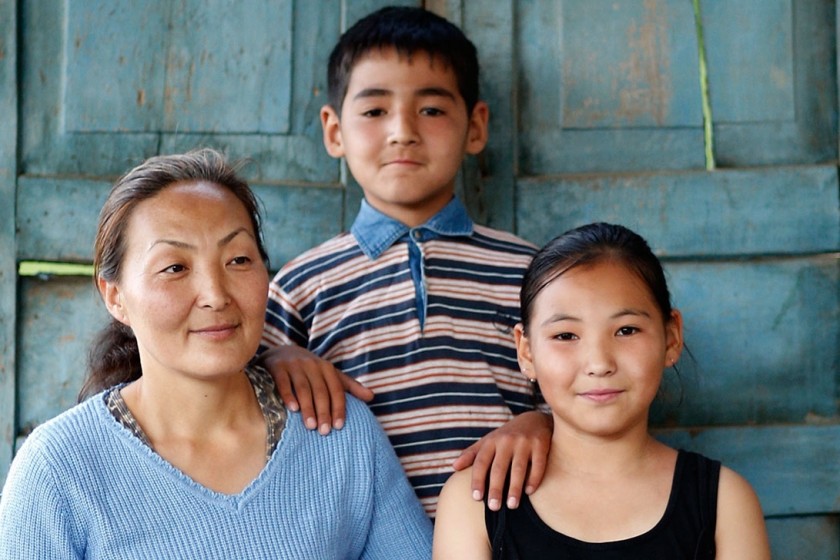
From Mongolia to Antaramej: The Difficult Road to Becoming a Citizen of Armenia
At first they would say “You’re a Mongolian”. Then, when I started to speak Armenian, they would say, “No, you’re Armenian”, recounts Varsik.
Bayandolgor (Bayina) Oyunchimeg, a woman from Mongolia, and her two children live in the Antaramej village in Armenia’s Gegharkounik Province. Fourteen years ago she married Hrahat Yeritsyan in Mongolia. Hrahat was a construction worker in Ulan Bator. Their two children, Varsik and Arshak, were born there.
Hrahat has a heart ailment and doctors advised him to live at a lower elevation than found in Mongolia. In 2011, the family relocated to Armenia. Hrahat is a native of the village of Martouni, but there was no place to live there. They found a dilapidated house in Antaramej, renovated it, and moved in. Hrahat Yeritsyan died this year from a heart attack.
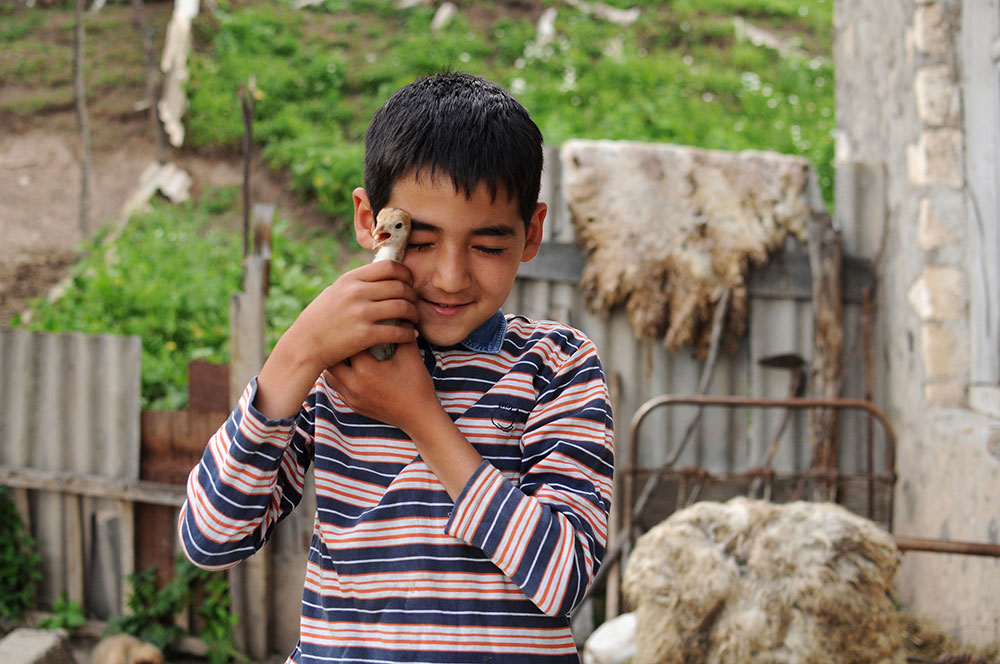
Antaramej is a small village of 163 inhabitants at the foot of the Geghama Mountains. Residents are mostly refugees from the Armenian-populated villages in the Shamkhor region of Azerbaijan. They left between 1988 and 1989. They raise animals and grow vegetables.
To reach Antaramej, at 1,575 meters above sea level, we had to change to a vehicle with more ground clearance given the poor state of the roads.
Artzroun, an Antaramej resident who was escorting us, said that almost everyone in the Tchambarak region knew the story of this family from Mongolia. Villagers often see Bayina head off to the forest by herself, how she collects wood, piles it on a donkey, and returns home.
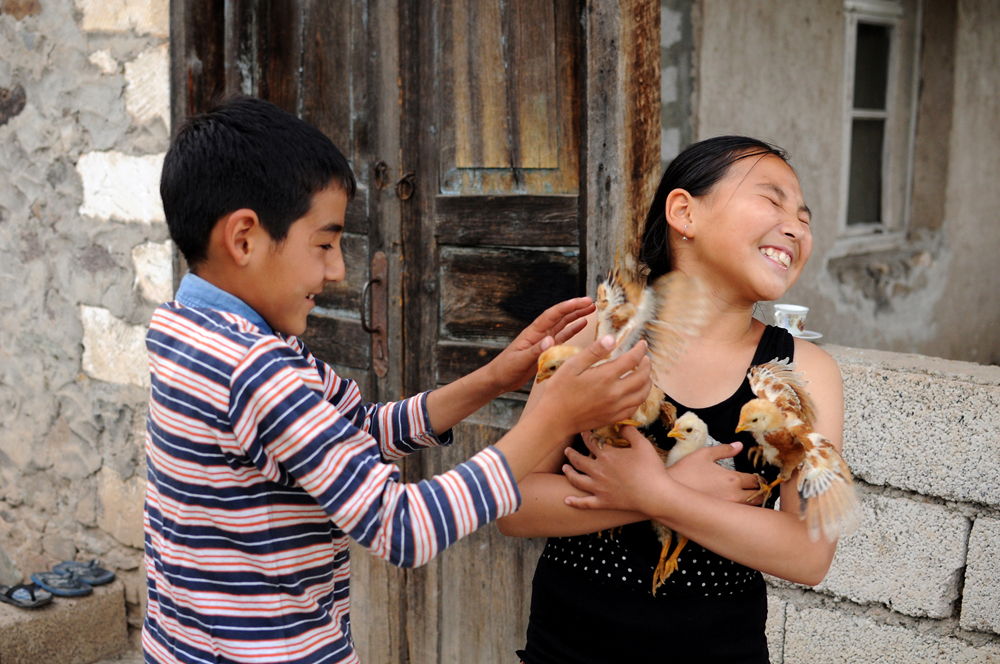
The road to Bayina’s house traverses a field of white daisies. The donkey, with its colt, is tied to a tree. Chicks scatter to and from on the stairs and the balcony. Varsik and Arshak, hearing the sound of the approaching vehicle, have entered the yard. Bayina is trying to fathom who is so interested in the family to have come all this way. The mother and children, with non-Armenian features, speak Armenian and invite the guests in.
Bayina says her kids speak better Armenian than she does. She remembers that for the first two years she and her husband spoke to each other in Russian. Slowly, I would ask how do you say this and that, a spoon and a fork, thank-you…There were Armenians in our town. When they came to our house, I’d snatch some words from them.”

“We came to Armenia. It was a bit difficult. No matter, people in the village understand me,” says Bayina, adding that she learns much from the kids. On the other hand, Varsik and Arshak are forgetting their Mongolian. Bayina says she doesn’t want to burden the kids. Let them strengthen their Armenian first and the Mongolian will come back.
9 year-old Arshak and 11 year-old Varsik attend the village school and are excellent pupils. “When mom’s relatives phone they start talking Mongolian. I try to understand but it’s no use. They speak to quickly,” Arshak says.
Bayina talks to her friends and relatives back in Mongolia mostly by phone via the social websites. She can’t use the telephone because each minute costs 520 drams. Her relatives want to come and visit but it costs too much.
The entire family history is contained in the red photo album which, according to Varsik, is very important to her mother. There are many photos showing Bayina singing on stage. She recounts that she wasn’t used to working the land and raising animals in Ulan Bator, the Mongolian capital. She was a singer.
“The first time I saw this house, I was about to run away. Gradually, I and my husband erected these walls. We wanted to build a bath-house but we never finished it,” Bayina says. She learned how to do village chores by asking her husband and neighbors. Now she cans veggies and fruit like the rest of them. She’s decided to fix the barn next year to raise cows and sheep. Then she wants to paint the balcony to make the place look like home.
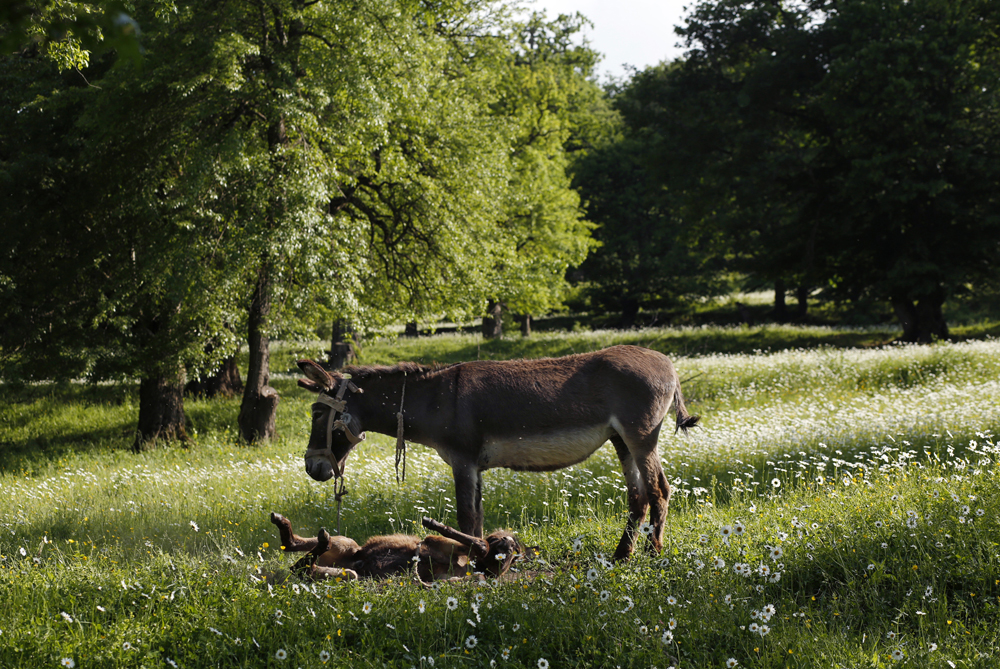
“It’s good if I don’t lose my mettle. Let’s be healthy and good,” Bayina says. The children try to help their mother whenever they can. Arshak, for example, sometimes accompanies his mother to the forest for wood and grass. Varsik stays behind to see that the chicks don’t run off.
Back then, my dad told me and Arshak that if we did our schoolwork well he’d buy us a bike. We learnt our lessons, but he never got around to it before…Dad isn’t here with us now. He passed away, but we still try to achieve success,” says Varsik.
Bayina is proud that Arshak and Varsik are doing well in school. Arshak says he likes all the subjects and that painting is his favorite. “You need a good attitude to paint. A good attitude happens when I learn about good things. For example, when I paint a pirate or other planets. If there is nothing to paint, I don’t. There’s no reason to,” Arshak explains.
As opposed to his sister, Arshak is more bashful and less talkative. When they arrived at the village, Varsik was the first to make friends. Now, she and Arshak frequently visit the neighbors to organize games. “At first they would say ‘You’re a Mongolian’. Then, when I started to speak Armenian, they would say, ‘No, you’re Armenian’”, recounts Varsik.
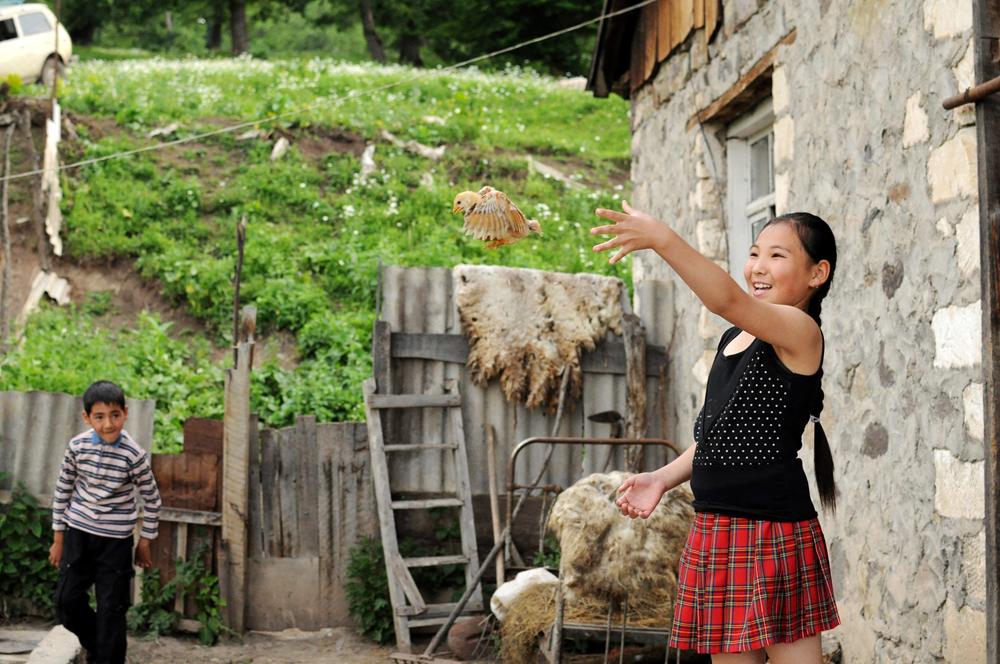
In addition to Armenian, they also learn Russian and French in school. Varsik is sad that she cannot learn English because there is no teacher. There aren’t many books at school, but one of the villagers has a private library. Varsik goes and picks a book every week to read.
“Mother says to start with the thin books and then work my way up to the fat ones. But I like the fat ones. I really like Armenian history books. I’m reading Gevorg Marzpetouni now,” Varsik says.
To get to a hospital Antaramej residents must travel to Tchambarak, Sevan or Ijevan. To even see the local doctor is an 8 kilometer journey to the neighboring village of Dprabak. To obtain medicine and other necessities, residents ask those traveling outside the village. These are the main challenges facing Antaramej resident Bayina.
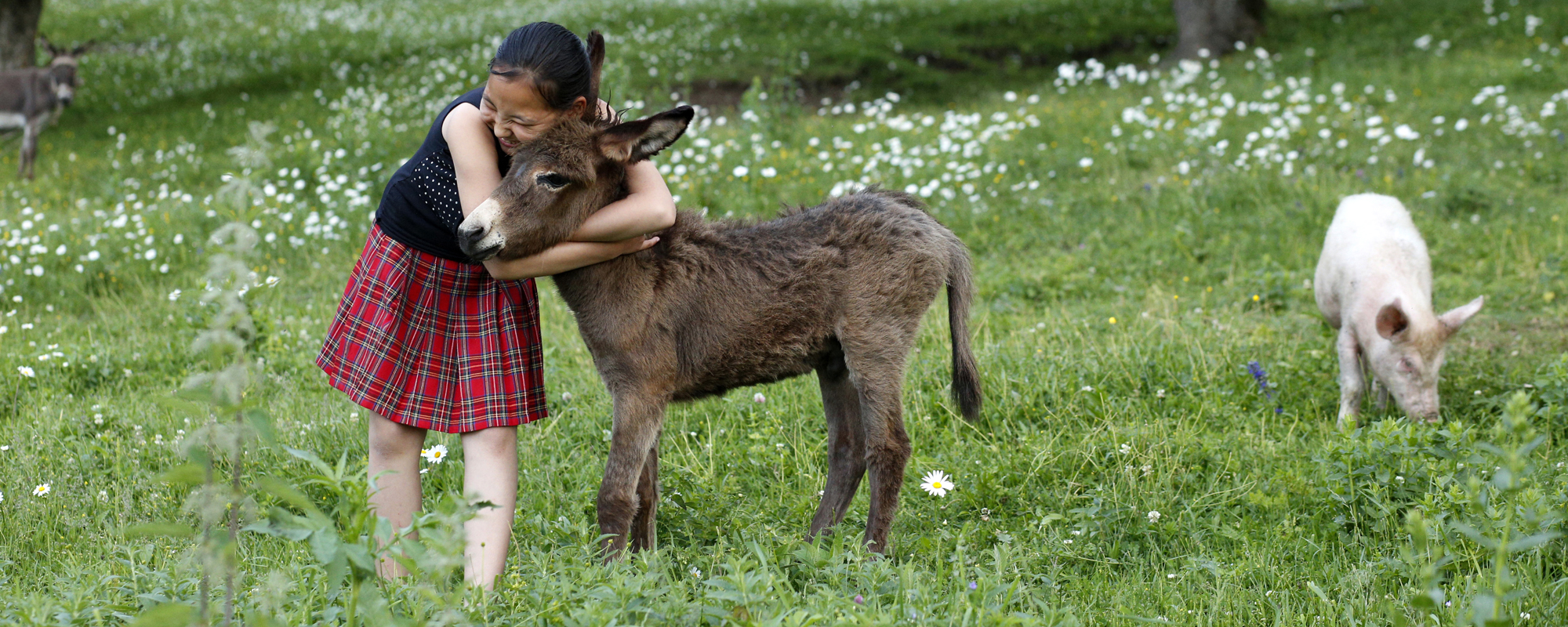
In March of this year, Bayina wrote to President Serzh Sargsyan, asking that he confirm the paternity of the children and to grant them citizenship. Her marriage to Hrahat Yeritsyan was never registered in Mongolia because they couldn’t get a document from Armenia verifying that Hrahat wasn’t previously married to someone else. There was no Armenian diplomatic presence in Mongolia.
To obtain copies of the birth certificates of Varsik and Arshak from Mongolia, Armenia’s Ministry of Justice has petitioned the Ministry of Foreign Affairs. The latter has said that it tried to get the documents via Armenia’s embassy in Kazakhstan but that no reply has yet been forthcoming.
In any event, Bayina has received a letter from the Armenian Police Department of Passports and Visa, requesting her husband’s death certificate and copies of her children’s passports in order to review the issue and take steps in the future. Bayina sent the documents and awaits an answer. To find out how far the process has gotten, Hetq sent an inquiry to the department.
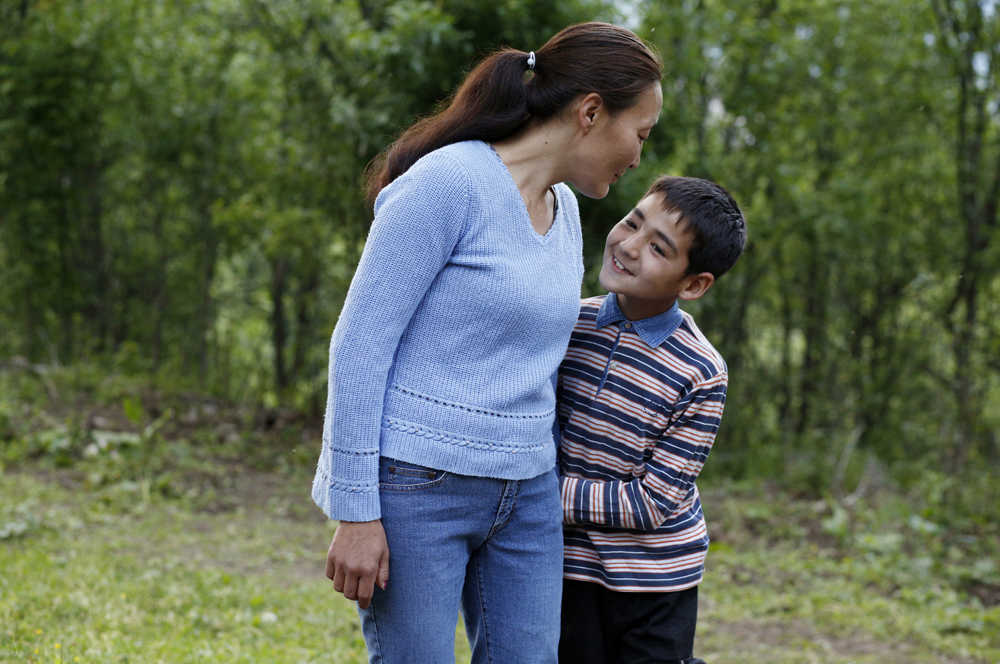
Bayina’s children don’t want to leave Armenia. They feel right at home here. They hope to receive citizenship as soon as possible, which will help them regarding their future education and employment.
“I don’t think about returning. My kids are in the 4th and 5th grades. What will happen if I take them and go? They’ve basically forgotten Mongolian. They’ll have to start from scratch if they go back,” Bayina says.
Authors:

 Videos
Videos Photos
Photos
Comments (7)
Write a comment